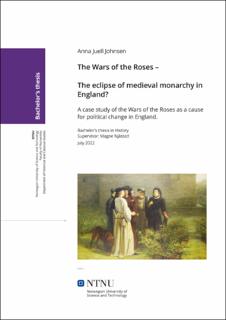| dc.description.abstract | Outline
The Wars of the Roses has often been associated with image of a destroyed aristocracy, big and bloody battles, long-lasting rivalries, and great civil wars that swept through England for more than 30 years. This picture has been central in many retellings from both Tudor loyalists and important literary figures like Shakespeare. In earlier research literature and dramatic retellings, The Wars of the Roses has been seen as a driving force from the shift from the Middle Ages to early modern times in England.
The image of the conflict as politically significant and even as a brutal and important conflict at all, has been largely disputed by varying historians in later years. The sources available to us implies that even though there is no doubt there was a complex dynastic conflict at the time, it was also marked by long periods of peace, reconciliation, and a functional political organisation. How then can the Wars of the Roses be said to have caused a watershed in English history, leading to the transition from one form of political society and state to another?
This bachelor thesis will provide a case analysis of the Wars of the Roses through various research literature to analyse whether it can be claimed that it was one of the main reasons for the shift in political organisation from a late medieval monarchy to an early modern one, and the turn from a weak and fragmented to a strong centralized political order in England. | |
